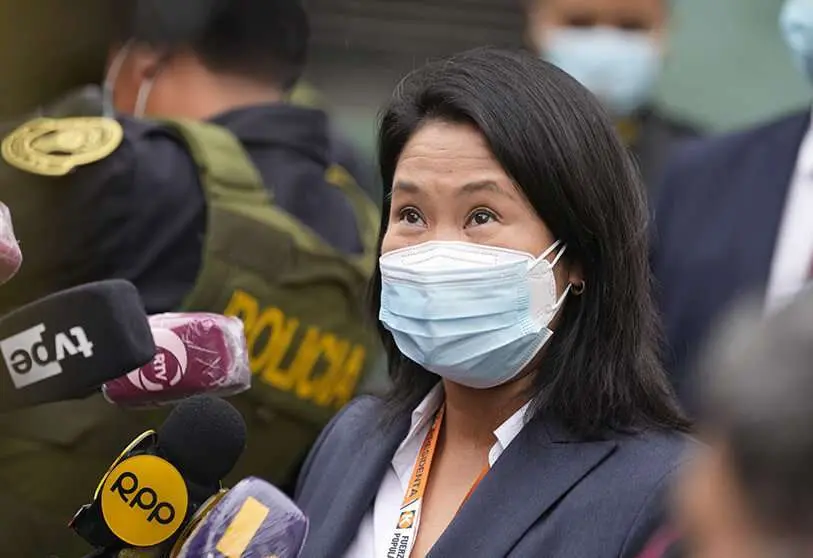Peru's justice system rejects request for Keiko Fujimori's remand in custody

The Peruvian court of justice declared that the preventive detention of Keiko Sofía Fujimori was inadmissible. This ruling by Judge Víctor Zúñiga Urday comes in response to a request by prosecutor José Domingo Pérez, who accused the presidential candidate of breaking the rules established in her conditional release by meeting with several witnesses in the "Lava Jato" corruption case, such as her party's spokesperson, Miguel Torres, and former candidate Lourdes Flores Nano.
"The prosecutor did not manage to send me to prison for the fourth time, but he wants to leave me alone at a decisive moment. I will never feel alone because I know that I have the support of more than 50% of Peruvians," said Keiko Fujimori on her official Twitter account, addressing her voters: "I will not let you down".
In the 11 June request, the public prosecutor pointed out that Fujimori would have skipped one of the restrictions imposed for her release from prison in May 2020. This refers to the prohibition on communicating with witnesses in the case in which he is accused of receiving illegal financing through the construction company Odebrecht for his presidential campaigns.

In his sentence, the judge rejects the Public Prosecutor's request, but recognises the existence of an approach by Keiko Fujimori to witnesses in the case. The judge, Víctor Zúñiga, affirms that Keiko Sofía Fujimori "did not comply with the rules that were imposed on her in April 2020," but rejects the request for pre-trial detention because he considers that there have been errors on the part of the prosecutor in the case in "not carrying out the formality of exhorting the infraction of the rule".
In addition, the judge urged the defendant to "comply with the rules of conduct and not to communicate with witnesses and co-defendants in the Odebrecht case" and clearly warned that "if she does not do so, she will be remanded in custody again".

The leader of Fuerza Popular left prison in Lima in May 2020 after the justice system lifted the sentence of preventive detention imposed on her for the Odebrecht case, in which she received economic aid for her 2011 and 2016 presidential campaigns, where she ran against and lost to Ollanta Humala and Pedro Pablo Kuczynski, respectively.
The presidential candidate, Keiko Sofía Fujimori, has been in pre-trial detention on three occasions due to this trial. However, the court decided to approve her appeal and revoke her pre-trial detention, stating that "the suspicion of guilt based" does not present sufficient weight to pass sentence.
Keiko Fujimori, after hearing the verdict of the hearing in which the pre-trial detention was denied, stressed that "it is fundamental to continue focusing on the most important issue, which is the counting of votes and the review of the minutes", insisting on her commitment "to ensure that every last minute is reviewed".
In the second round of Peru's elections, which took place on 6 June, Keiko Fujimori was running against left-wing leader Pedro Castillo. In the vote count at the National Office of Electoral Processes (ONPE) on Tuesday 15 June, Pedro Castillo won with 44,058 votes. However, the winner was not officially declared, as the Fujimori candidate asked for the annulment of hundreds of voting records for "electoral fraud at the polling station".

On 16 June, the National Jury of Elections (JNE) agreed that "it will only proclaim the definitive results of the second round of the presidential elections of 6 June when it has resolved all the observed tally sheets and the requests for annulment presented after the process".
So far, Peru still does not officially know the winner of the elections, as both parties, Fuerza Popular and Perú Libre, have submitted 1,088 requests for the annulment of the results. According to ABC, 95% of the annulment requests have been denied in the Special Electoral Juries distributed nationwide. Of these, 201 appeals have been filed and will be reviewed by the National Jury of Elections (JNE), presided over by Jorge Salas Arenas.
Upon completion of this process, the JNE will officially announce the next leader of Peru.
Latin America Coordinator: José Antonio Sierra








